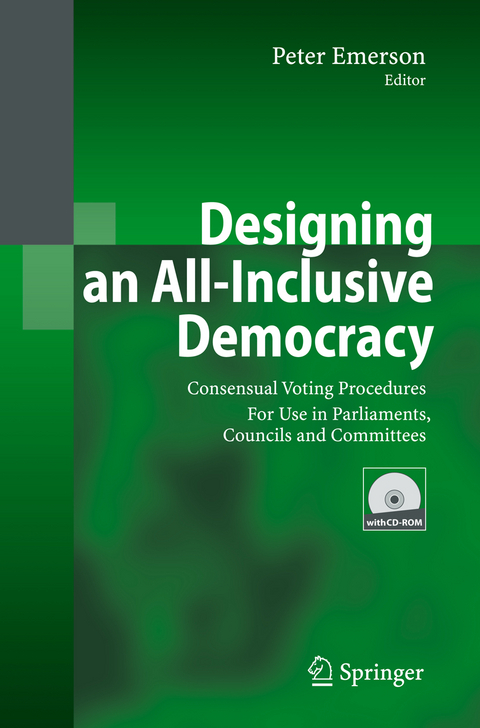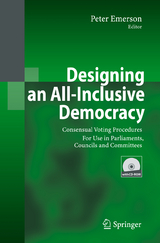Designing an All-Inclusive Democracy
Democracy is for everybody, not just a majority. This book describes the voting procedures by which majority rule may be replaced by a more consensual system of governance. In a word, such an inclusive polity can be achieved by asking the voters or, more usually, their representatives in councils and parliaments, to state their preferences, so to facilitate the identification of that option which gains the highest average preference score. The first part of the book describes three different voting procedures, the Modified Borda Count, the Quota Borda System and the Matrix Vote, and gives a number of hypothetical examples, all clearly depicted in tables. In the second part, the voting mechanisms are discussed against the background of the theory of voting, social choice theory, human rights and mediation practice. The book includes a foreword by Sir Michael Dummett and contributions by Elizabeth Meehan, Hannu Nurmi and Maurice Salles, among others.
Designing an All-Inclusive Democracy.- Collective Decision-making The Modified Borda Count, MBC.- A Pluralist Parliament for a Plural Society The Quota Borda System, QBS.- Electing a Power-sharing Executive The Matrix Vote.- The Art or Science of Manipulation.- A Critique.- The Theory of Voting and the Borda Systems.- Assessing Borda's Rule and Its Modifications.- Human Rights and Voting Procedures in Plural Societies.- Inclusive Decision-making in Mediation and Politics.- Conclusion.- The Realpolitik of Consensus Voting Peter Emerson with Assistance from Elizabeth Meehan.
From the reviews:
"Emerson is primarily concerned with societies that are deeply split politically along ethnical, cultural, or religious lines. ... The book must be seen as part of a project to promote 'non-majoritarian' methods, especially in deeply split societies. ... The participation of election theorists and law specialists in the book, and the book's acceptance by a major publisher show a serious commitment from Emerson et al." (Eivind Stensholt, Voting matters, Issue 24, 2007)
"The inclination to identify the popular will with the recipient of a majority of votes has been criticized ... . Peter Emerson's edited volume, Designing an All-Inclusive Democracy: Consensual Voting Procedures For Use in Parliaments, Councils and Committees, offers an alternative, 'non-adversarial democratic structure' ... . Emerson and the other contributors to this volume deserve credit for crafting a practical and accessible entry into a debate typically conducted in technical, theoretical terms, and for highlighting the importance of discussion to the choice process." (Joel Parker, Public Choice, Vol. 135, 2008)
"Peter Emerson ... has written a book called Designing an All-Inclusive Democracy: Consensual Voting Procedures For Use in Parliaments Councils and Committees, which is a decisive attempt to change the situation. ... the sense of urgency these scientists have invested in their designs is remarkable. ... the book Designing an All-Inclusive Democracy, which may be recommended not only to those who believe there is a strong connection between particular electoral procedures and particular results." (Roman Chytilek, Central European Political Studies Review, Spring/Summer, 2008)
"Emerson combines techniques for the dynamics of a group interaction with a voting rule, the intent of this mixture is to engender a civil discourse leading to more useful group decision outcomes. ... There is much to learn from this book, so I suggestthat it should be in your bookshelf. ... this is a book that should be seriously considered by practitioners involved in group decisions." (Donald G. Saari, Social Choice and Welfare, Vol. 35 (2), July, 2010)| Erscheint lt. Verlag | 3.5.2007 |
|---|---|
| Zusatzinfo | XV, 187 p. With CD-ROM. |
| Verlagsort | Berlin |
| Sprache | englisch |
| Maße | 155 x 235 mm |
| Gewicht | 450 g |
| Themenwelt | Sozialwissenschaften ► Politik / Verwaltung ► Politische Theorie |
| Wirtschaft ► Volkswirtschaftslehre ► Mikroökonomie | |
| Schlagworte | Borda • Consensus • Democracy • Demokratie • Geschäftsordnung • Governance • Hardcover, Softcover / Politikwissenschaft • HC/Politikwissenschaft • Konsens • Mediation • parliament • Politics • voter • Voting • Voting procedure • Wahl |
| ISBN-10 | 3-540-33163-8 / 3540331638 |
| ISBN-13 | 978-3-540-33163-6 / 9783540331636 |
| Zustand | Neuware |
| Haben Sie eine Frage zum Produkt? |

